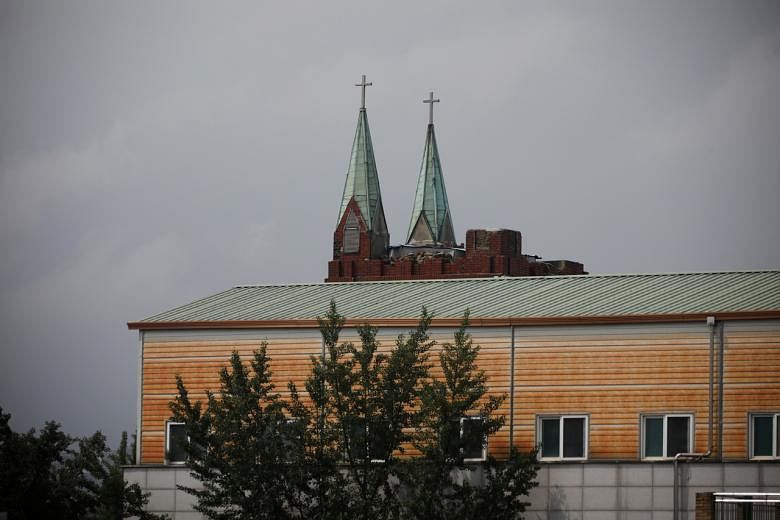SEOUL (THE KOREA HERALD/ASIA NEWS NETWORK) - The church at the centre of South Korea's coronavirus resurgence has said that it will sue the Seoul Metropolitan Government for enforcing contact tracing.
Representatives of the Sarang Jeil Church last Friday (Aug 21) said at a press conference outside the church in Seongbuk, a district in northern Seoul, that the police, under the direction of the city office, "forcibly entered the church" in trying to obtain information for contact tracing last Thursday. The fierce stand-off between church officials and the police lasted nearly 10 hours.
"We will take legal action against Seoul officials for ordering the police search," they said.
History seems to be repeating itself in the country's newfound plight in battle against Covid-19 as cases escalate among religious groups. At the epidemic's initial peak in late February, the coronavirus had spread mainly through followers of the Shincheonji Church of Jesus in Daegu.
The latest outbreak among worshippers at the Seoul church is the second-biggest cluster of Covid-19 in Korea - behind Shincheonji's over 5,200 - with at least 739 confirmed cases as of Friday morning.
The church's pastor, Reverend Jung Kwang-hoon, was diagnosed with the disease last Monday after claiming to be healthy at a rally attended by hundreds in central Seoul.
The church is accused of withholding key details and refusing to cooperate with public health officials, with its leaders claiming their freedom to worship is under threat from the new government orders. The government last Tuesday placed a ban on in-person services and gatherings at churches in the Seoul area.
Christian groups say the worship ban violates their right to practise their faith. In a message to its members, the Communion of Churches in Korea said last Thursday that the orders were "not acceptable" and that "services cannot be stopped".
It said: "Church is essential."
Health authorities say certain worship activities such as singing together can increase the likelihood of coronavirus transmission.
"Singing and chanting may cause respiratory droplets to travel further than talking," said Mr Kwon Jun-wook, the deputy director of the state disease control agency, in a briefing.
Last month, 11 people who attended choir practice at a church in Songpa, southern Seoul, tested positive for the coronavirus.
Politicians have denounced the church for failing to comply with safety guidelines.
In a Facebook statement posted last Thursday evening, former prime minister Lee Nak-yon said the church "appears incapable of redeeming itself" and that its defiance of public health orders "borders on anti-social crime".
Former Democratic Party lawmaker Kim Bu-gyeom issued an even more strongly worded statement the same day, calling the church "a group of far-right terrorists waging biological warfare against the country".
Meanwhile, some experts worry that the finger-pointing could interfere with contact tracing efforts.
"From Shincheonji to nightclubs to churches, the subject of anger seems to be shifting as the pandemic unfolds," said infectious disease specialist Lee Jacob of Hallym University Hospital in Gyeonggi Province. "But blaming will only make it harder for people to seek testing."
Dr Kim Dong-hyun, president of the Korean Society of Epidemiology, said fear of public criticism can intimidate people into deferring needed medical attention.
"People should be allowed to get tested without being exposed," he said.











